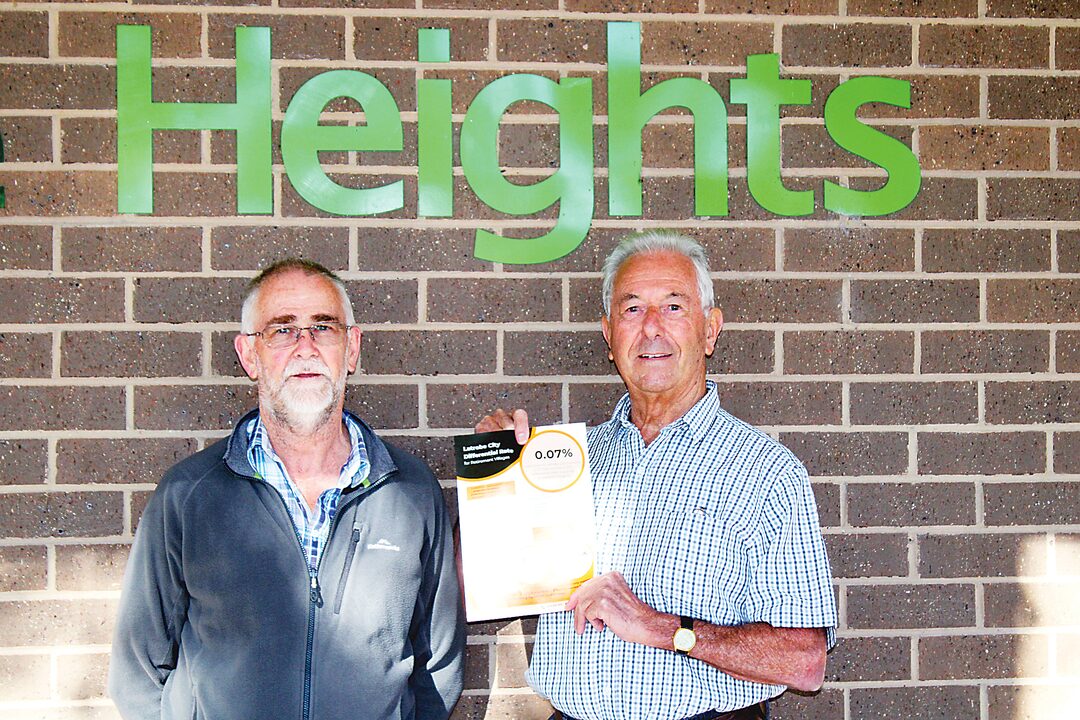By AIDAN KNIGHT
TRARALGON’S Dalkeith Heights Retirement Village has seen residents feel unfairly charged in their council rates, leading to the launching of a campaign asking for a discount within the scheme.
A group of residents led by Alan Burton and Ben Guzzardi, attended Latrobe City Council’s May meeting, and addressed the chamber with a proposed 25 per cent “differential rate” to be applied to those living in retirement homes across the council jurisdiction. This was met with applause from half the gallery, as many fellow residents attended in support of this action, resulting in a full gallery as the pair made their case to all present.
Council heard that villagers fund and maintain their own amenities further than their private domiciles – pool, gardens, gyms, restaurant, barbecue areas, games rooms, etc, and declare themselves self-sufficient as residents.
“The only service Dalkeith Heights residents receive from council is rubbish collection weekly,” Mr Guzzardi said, declaring the rates an inequitable system.
Mr Guzzardi has been driving this cause for the past three years, one which has gained the support of multiple other retirement villages in Latrobe City: The Range in Moe, Latrobe Valley Village Newborough, and Yinnar Gardens being the most vocal.
More than 50 residents from this assortment of facilities attended the May 2025 Latrobe City Council meeting, to see Mr Guzzardi and fellow members of the Dalkeith Heights Residents Association present their case.
This saw the proposition of their “25 per cent Differential Rate” scheme, which has been developed over the course of the three-year period.
The presentation saw the association tell the gallery that to grant the Dalkeith Heights residents 25 per cent would cost Latrobe City Council $47,500 annually, which in the big picture of it all is a 0.7 per cent reduction rate income overall – which the association has worked out could be offset by inflating other 40,439 rateable properties by $1.18, atomising what income council would lose from the village.
Comparatively, the association say it would save residents $47.5k annually, while Latrobe City Council will still make a net profit of $142.5k per year (based off current figures).
“There are 158 units in the village – 81 of them are single women. Many are pensioners doing it pretty tough,” Mr Guzzardi told the Express.
“The average resident is 81-years-old. They’ve got a pool, theatre, gym and library inside the village. Why would they pay to access external facilities they don’t use? How does an 81-year-old get down to the aquatic centre? What do they do – pay $15 for a taxi each way? It’s just not feasible.”
Mr Guzzardi has outlined in an executive summary within the official proposal brochure: “retirement villages form an integral part of the community providing safe and secure environments for the elderly sector. Our elderly citizens are a fundamental component of society. There is an obligation on council to protect and support the older sector of the community and to ensure the rating system is fair and equitable”.
Mr Guzzardi has personally had multiple meetings with council executive staff, and says Latrobe City executive staff have “given us plenty of time, almost to a patronising extent.”
He says that council says they cannot make these changes for one village alone, and would have to cease charging rates from retirement villages across the board, which would be a big loss of income that could be applied to public resources.
“ They say, oh look, we’ve got to build the roads, and we’ve built the art centre, and we’ve built the swimming pool and all that – all infrastructure that would exist whether Dalkeith did or not,” Mr Guzzardi said.
His associate and partner in the process, Alan Burton said that upon his independent review of the current legislation, he was of the opinion that council’s refusal to acknowledge the unique services levels and capacity to pay for residents raises questions about compliance with key principles within the Ministerial Guidelines for Differential Rating (published April 26, 2013).
When prompted for comment, council’s acting chief executive Tim Ellis stated: “Latrobe City Council conducts an annual budget process that includes a review of all differential rates, including those related to retirement villages. Additionally, council maintains a Revenue and Rating Plan that must be reviewed every four years, with the next review scheduled for completion by June 30, 2025.”
Both the Draft Budget and Revenue and Rating Plan were out for community consultation until May 27, 2025. Latrobe City Council encouraged anyone interested to make a submission.
Despite appearing to receive majority support during February’s budget sessions, with sources suggesting a five to four vote in favour, the proposal was ultimately overturned after alleged pressure from council executives, according to Guzzardi.
He claimed that two councillors reversed their votes following internal influence, resulting in a final 6–3 vote against the rate reduction.
“It appears Dalkeith Village residents will not enjoy a rate reduction for 2025–26,” Guzzardi wrote in a recent letter to the Dalkeith Heights Residents Association.
“I have been led to understand the main reason for rejection was that Latrobe City is only increasing rates by 1.5 per cent instead of the allowed 3.0 per cent. After their disappointing result, the Resident’s Association remains undeterred, and plans to approach Latrobe City Council again closer to the 2026/2027 budget, with a revised application encompassing all retirement homes within the council area, not just Dalkeith.











